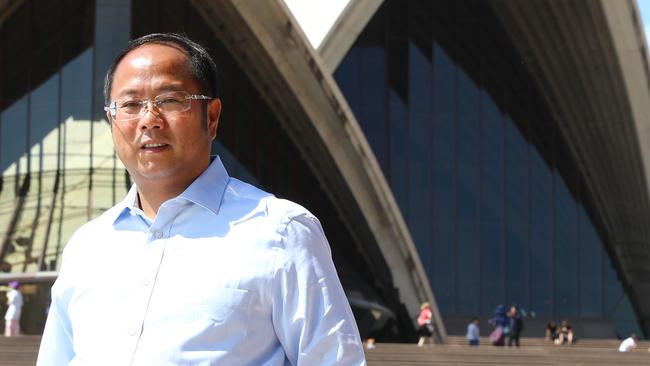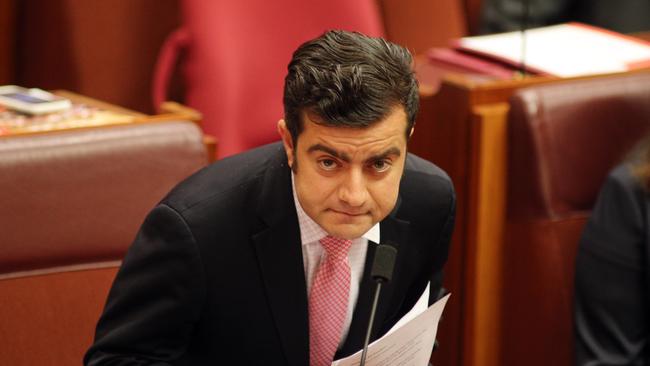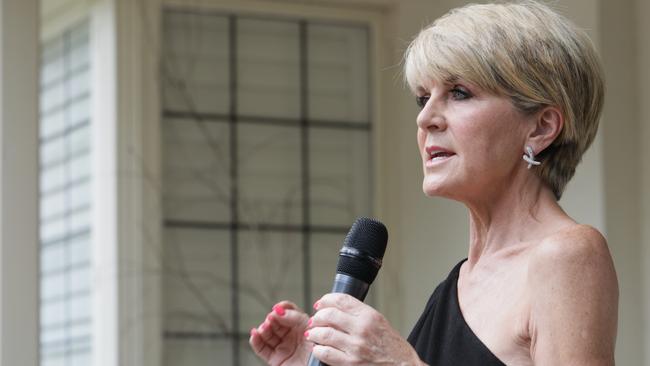‘We should hold a blowtorch to their bellies’
There’s something rotten in a system that sees politicians of all stripes cosying up to a rich donor everyone suspects may have links to a foreign government, writes Clive Hamilton.
In November 2017, then Prime Minister Malcolm Turnbull described Chinese billionaire and political donor Huang Xiangmo as a foreign national “very, very close indeed” to China’s Communist Party government.
That was after Sam Dastyari was sprung giving his friend Huang advice on how to avoid ASIO’s surveillance, leading to accusations that he was a “double agent”.
Huang’s long and desperate battle to attain Australian citizenship was doomed from that day, and yesterday we learned he has officially been denied an Australian passport and is now trapped overseas, unable to return to his $13 million Sydney mansion.
But if Huang Xiangmo has been found to be unfit to be a citizen of this country, where does that leave the host of current and former politicians who have enjoyed his patronage and cosied up to him?
After a reported hasty exit from China in 2013, Huang soon began using his wealth to cultivate networks among politicians.
RELATED: Sam Dastyari on the Chinese scandal that cost him his career

In 2014 he was made chairman of the powerful Australian Council for the Promotion of Peaceful Reunification of China, a Communist Party-linked organisation at the centre of Beijing’s influence operations in Australia.
Its new boss said “that the sons and daughters of China, both at home and overseas, are of one heart and mind, united as one”. Not a great start for someone who said he wanted to pledge his allegiance to Australia by becoming a citizen.
One of Huang’s first networking moves was to recruit former New South Wales Labor treasurer Eric Roozendaal as vice-chairman of his company, Yuhu.
He was soon promoted to CEO. (He’s now resigned). Roozendaal had been general secretary of NSW Labor with a contact book among Labor heavyweights that was unrivalled, except by that of his successor Sam Dastyari.
Over the four years from 2012, Huang’s generosity would see $1.78 million going into Labor’s coffers. Some of it came from his companies, employees, family members or close associates.
One donation was made by an otherwise unidentified Meijuan (Anna) Wu, who turned out to be Yuhu’s company secretary. Before that she worked as a barista at the Max Brenner chocolate bar chain, but she managed to scrape up $50,000 to give to the Liberal Party.
But the ex-politician most closely associated with Huang Xiangmo is former NSW Premier and foreign minister Bob Carr.
With a $1.3 million donation, Huang founded the Australia China Relations Institute, a pro-Beijing “think tank” at the University of Technology Sydney. He personally selected Bob Carr as its director.
Since then, ACRI has spewed out a torrent of “research” and comment favourable to the Chinese Communist Party.

UTS was so grateful for the money that it gave Huang the right to call himself “professor”.
The People’s Daily was soon referring to him as an “Australian scholar”, although he is neither Australian nor a scholar.
Huang Xiangmo was never picky about his political connections. Adding in offerings from his family, employees and close associates, his total political donations come to almost $2.9 million — $1.8 million to Labor and $1.1 million to the Liberal Party. That buys a lot of influence.
In 2015 he employed the former NSW deputy premier and National Party leader Andrew Stoner.
Stoner provided advice on investments in agribusiness, including the $2 billion fund Huang had formed to buy up Australian farms.
Huang also cultivated a close relationship with Andrew Robb, trade minister in the Abbott government. While trade minister, Robb singled out Huang’s agricultural investment fund for praise.

Along with Labor Party leader Bill Shorten, Robb was an honoured guest at the wedding of Huang’s daughter, Carina, in January 2016.
Andrew Robb saw the China-Australia Free Trade Agreement as his greatest achievement. As he was finalising it, he met with Huang Xiangmo in Hong Kong.
Soon after, Huang organised large sums of money to be channelled into the Victorian Liberal Party (Robb’s base), as well as Robb’s personal election fund in his Goldstein electorate, including $50,000 on the day the trade agreement was settled.
When foreign minister Julie Bishop gave an upbeat speech at the opening ceremony of Huang’s new think tank at UTS, Huang’s company donated $230,000 to her West Australian branch of the Liberal Party, despite the fact Huang had no business or any other apparent links with the state.
In 2017, the government was warned by ASIO boss Duncan Lewis about accepting donations from Huang. But that didn’t stop Tony Abbott last year from funnelling donations from Huang to Liberal MPs.
There’s something rotten in our political system that sees our politicians cosying up to a rich donor that everyone suspects may have links to a foreign government.
Now that Huang has been banned from Australia, those politicians will want to sweep it all under the carpet.
But we should hold the blowtorch to their bellies and make them explain themselves.
Clive Hamilton is professor of public ethics at Charles Sturt University in Canberra and the author of Silent Invasion: China’s Influence in Australia.


